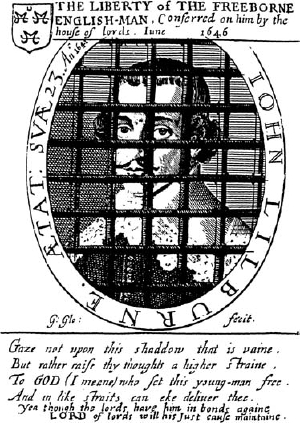Liberty Matters
Popular Sovereignty and the Limits of Power
 When thinking about the constitutional thought and proposals of the Levellers, I find that I agree with both Rachel and Iain, strange as that may seem to both of them perhaps. This is because the Levellers' thought has an unusual combination of radical democratic thinking and individualism. Consequently we find two things in their more-theoretical writings and their more-concrete proposals: a radical doctrine of popular sovereignty and representation, and a strict limitation of the scope of that sovereignty. The question is how these two are combined. The way they are combined makes for interesting comparisons with later political settlements, in particular the Constitution of the United States.
When thinking about the constitutional thought and proposals of the Levellers, I find that I agree with both Rachel and Iain, strange as that may seem to both of them perhaps. This is because the Levellers' thought has an unusual combination of radical democratic thinking and individualism. Consequently we find two things in their more-theoretical writings and their more-concrete proposals: a radical doctrine of popular sovereignty and representation, and a strict limitation of the scope of that sovereignty. The question is how these two are combined. The way they are combined makes for interesting comparisons with later political settlements, in particular the Constitution of the United States.As Rachel says, the Levellers do not appear to have shared the doubts about direct representation of the popular will that authors such as Harrington and Milton had. The reason, in my view, was their belief that all or the overwhelming majority of people were guided by a reason, which should lead them, with proper consideration, to a political position that would eschew giving one person power or allowing a single religious establishment. In their view all people were self-owners and had a direct interest in their own personal independence and as such would not consent to surrendering their independence or delegating their sovereign power in ways that would harm themselves, because of the natural instinct for self-preservation combined with the belief that most people's interests were naturally aligned. Hence the repeated allusions to the "honest" and "well affected." This explains the direct and unmediated representation of the sovereignty of the individuals who composed the "people." It is their understanding of the nature of individual human beings and their consciousness that explains their confidence.
How then to explain the many institutional limits put upon that power in documents such as the Agreement of the Peopleand in particular the Agreement of the Free People of England? I think there are two reasons. One, which Rachel refers to, is what we might call (in high anachronism) a proto-public-choice argument. The concern was not so much that the people individually and in the aggregate would abuse their sovereign power. Rather it was that the actual human beings to whom the power was delegated (the representative) would do so. The feeling was (on the evidence of the conduct of both the king and the Long Parliament) that power would tempt and corrupt the people charged with exercising it (in a premonition of Acton). In contemporary terms they identified the existence of a principal-agent problem. This explains not only the restrictions on the matters the "representative" could concern itself with and on its scope of action, but also stipulations such as that no member could be reelected until a term had elapsed. As soon as the representatives reverted to being members of the public, they would then once again face the same kind of incentives as the rest of the people (hence also the stipulation of annual elections, designed to prevent the emergence of a cohesive political class). This also explains why they were at pains to exclude what would later be called "class legislation," which benefitted an organized minority.
That however is not the only element in their thinking, I would argue. The other was that there were some areas (such as religious observance or being compelled to serve in wars, particularly outside the country) where no rational actor, knowing himself to be only one of many, would delegate such power to others simply because he would know that it could easily redound against him and also because he knew it was likely to lead to civil dispute because of the individual and personal nature of matters of conscience. So in such areas the sovereign individuals who composed the people and delegated their power or a portion of it to their representatives would not delegate the power to deal with such matters. In other words, they were excluded from the sphere of politics or collective decision-making -- or at least collective decision-making that encompassed and bound the entire political community.
This explains the contrast between the Levellers' proposed settlement and the U.S Constitution. In the latter there is a delegation of a list of specified and enumerated powers. In Leveller proposals the grant of power is framed as absolute and unlimited. It is the exceptions where that absolute and unlimited power does not apply that are specified and enumerated. The history of the last 200-plus years has shown that the specified and enumerated powers have tended to expand at the expense of the unspecified and unenumerated popular power. It could be that when the exceptions rather than the powers are specified, the opposite process would apply.
Copyright and Fair Use Statement
“Liberty Matters” is the copyright of Liberty Fund, Inc. This material is put on line to further the educational goals of Liberty Fund, Inc. These essays and responses may be quoted and otherwise used under “fair use” provisions for educational and academic purposes. To reprint these essays in course booklets requires the prior permission of Liberty Fund, Inc. Please contact oll@libertyfund.org if you have any questions.